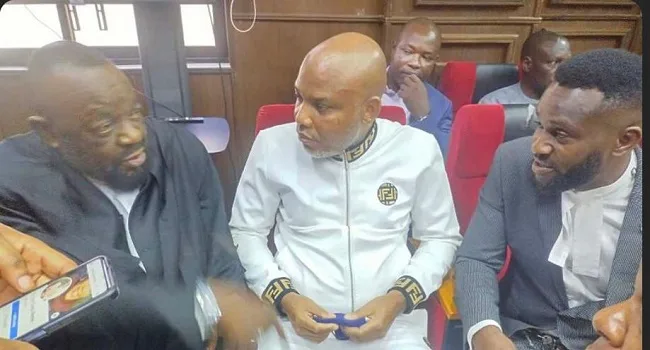Justice James Omotosho of the Federal High Court in Abuja has dismissed the fundamental human rights suit filed by the detained leader of the Indigenous People of Biafra (IPOB), Nnamdi Kanu, against the Federal Government.
Kanu sued the Attorney-General of the Federation and the Department of State Service for ₦1bn in damages for alleged rights violations.
The IPOB leader claimed that the DSS and its director general violated his right to a fair hearing by allegedly preventing his lawyers from having unhindered interactions with him while he was being detained in preparation for his defence in his criminal
While delivering judgment, Justice Omotosho, held that Kanu failed to provide credible evidence to sustain his claims that his interactions with his lawyers were interfered with, that he was denied unhindered access to his lawyers, and that DSS officials eavesdropped on his conversations with his lawyers, which constituted a breach of his right to a fair hearing.
Justice Omotosho held that the claims that Kanu was denied unhindered access to his lawyers by the operatives of the DSS, and that the officials eavesdropped on his conversations with his lawyers in the preparation for his defence, could not be established.
The IPOB leader, through his lawyer, Aloy Ejimakor, had sued the Federal Republic of Nigeria (FRN), Attorney-General of the Federation (AGF), DSS, and its DG as 1st to 4th respondents, respectively.
In the originating summons, he prayed for eight reliefs.
He sought “a declaration that the respondents’ act of forcible seizure and photocopying of confidential legal documents pertaining to facilitating the preparation of his defence, which were brought to him at the respondents’ detention facility by his lawyers, amounted to denial of his rights to be defended by legal practitioners of his own choice.”
He also sought a declaration that the respondents’ act of preventing his counsel from taking notes on the details of counsel’s professional discussions/consultations with him at DSS detention was unlawful.
He further sought a declaration that the respondents’ act of eavesdropping on his confidential consultations/conversations with his lawyers amounted to a denial of his right, among others.
Kanu, therefore, sought an order of injunction restraining and prohibiting the respondents from their act of forcible seizure, and photocopying of confidential legal documents brought to him at the detention facility by his lawyers.
He also sought an order mandating the respondents to jointly and severally pay the sum of ₦1bn as damages for the mental, emotional, psychological, and other damages he suffered as a result of the breach of his rights, among others.
But in a counter affidavit, the DSS denied allegations levelled against it.
In the application deposed to by Yamuje Benye, a legal department staffer, he said 11 paragraphs in Kanu’s affidavit were untrue.
He stated that Kanu was in safe and secured custody of the DSS, and that he was not detained in solitary confinement.
According to Benye, Kanu was allowed access to his family members and team of lawyers on his visiting days, without any hindrance whatsoever.
He argued that the IPOB leader was permitted to interact and consult with his lawyers on his visiting days without any interference.
He said at no time did any DSS personnel seize or confiscate documents brought to Kanu by his lawyers or any other person.
He added that their personnel never denied Kanu’s lawyers the professional liberty to perform their lawful duty of discussing, consulting, and interacting with his lawyers.
The applicant has consistently requested that various prayer books and religious materials be brought to him as part of his fundamental human right,” he said.
Benye added that Justice Binta Nyako, who is presiding over Kanu’s criminal trial, has always maintained that visits to him should always be under supervision, as it is the best practice all over the world.
According to him, mister Kanu, along with his counsel, was permitted to consult and interact on visiting days in one of the best interview facilities of the DSS to ensure maximum comfort of the applicant and his visitor(s).
The official, who denied allegations that the personnel usually record their interaction during visits, said “there is no basis for eavesdropping and recording of their conversations.”
He said, in line with the Service Standard Operation Procedure (SOP) of the State Security Service, all visitors to her facility are subjected to normal routine security checks, and items in their possession are scanned.
According to him, this is to avoid unauthorised materials making their way into the facility.


